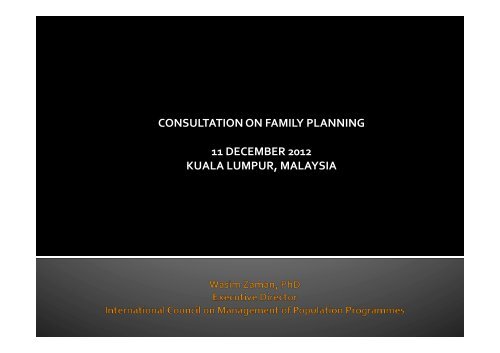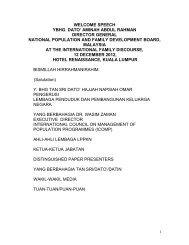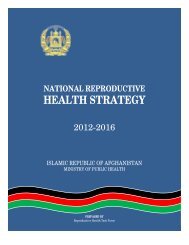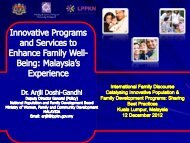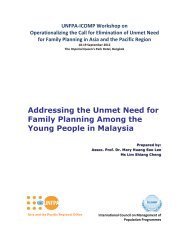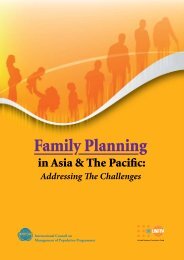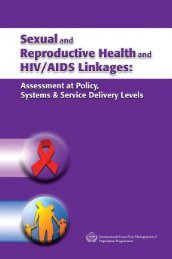presentation made by Dr Wasim Zaman, Executive Director of ...
presentation made by Dr Wasim Zaman, Executive Director of ...
presentation made by Dr Wasim Zaman, Executive Director of ...
Create successful ePaper yourself
Turn your PDF publications into a flip-book with our unique Google optimized e-Paper software.
CONSULTATION ON FAMILY PLANNING 11 DECEMBER 2012 KUALA LUMPUR, MALAYSIA
¡ FP in Asia for many decades – significant achievements– many challenges remain ¡ Despite having national FP programmes for many years, CPR is stagnating and FP needs remaining unmet in many countries – Bangladesh, Indonesia, Nepal and Pakistan – are some examples ¡ In some countries – large unmet need, disparities amongst states or provinces »
¡ Countries such as Bangladesh, India and Pakistan also show inequity in contraceptive use – need commitment from government and private sectors on supply ¡ There is also considerable variation <strong>of</strong> unmet need for FP i.e. Samoa (40%) and Solomon Island (under 10%); ¡ Access is not the only determinant factor <strong>of</strong> unmet need, but “unwillingness” which arising from socio-‐cultural barriers, health concern and low knowledge ¡ High Unmet Need among young people (married & unmarried); people living with HIV; people in lower economic quintile; migrants & displaced people. »
¡ Many countries in Asia Pacific are on track on MDGs – however significant number are lagging behind in achieving health related MDGs , particularly MDG 5a and 5b ¡ Strong evidence that meeting the needs for FP can accelerate achievement <strong>of</strong> MDGs ¡ Investment in FP can contribute towards achieving MDG targets such as education, child mortality, HIV, environmental sustainability »45 40 35 30 25 20 15 10 5 0 Progress towards MDG 5 in Countdown countries Overall progress as <strong>of</strong> 2010 On track Making progress Insufficient progress No progress Source: WHO and UNICEF, Countdown to 2015
7 6 5 4 3 2 1 0 Asia 6 5 4 3 2 1 0 Pacific »
3.5 3 2.5 2 1.5 1 0.5 0 Countries with TFR between 2 -‐ 4 2 1.5 1 0.5 0 Countries with TFR less than 2 »
100 1995 90 2000 80 Latest Available 70 60 50 40 30 20 10 0 »Source: DHS and World Contraceptive Use
35 30 25 1995 2000 Latest Available 20 15 10 5 0 »Source: DHS and World Contraceptive Use
Some key challenges in meeting the ICPD agenda: ¡ Inequalities and inequities between and within countries ¡ Universal access to comprehensive quality SRH services, supplies and information ¡ Recognition <strong>of</strong> the individual, society and culture »
¡ Attended <strong>by</strong> 170 from 24 countries in the region. ¡ OUTCOME -‐ A Call for the Elimination <strong>of</strong> Unmet Need for Family Planning in Asia and the Pacific ¡ The goal is for governments, CSO and donors to ensure equitable access to quality family planning information and services »
1. Leadership & governance 2. Adequate financial resources 3. Quality and coverage <strong>of</strong> FP information and service delivery 4. Community engagement 5. Unique needs <strong>of</strong> young people 6. Commodity security 7. Adequate and equitably distributed supply <strong>of</strong> skilled human resources 8. Partnerships and collaboration with stakeholders 9. Data collection and analysis <strong>of</strong> disaggregated data 10. Operations and socio-‐cultural research »
1. Improving the quality and coverage <strong>of</strong> FP information and service delivery 2. Responding to the unique needs <strong>of</strong> young people 3. Ensuring commodity security 4. Strengthening community engagement and demand for family planning services 5. Strengthening partnerships and collaboration with stakeholders »
1. Lack <strong>of</strong> political will and commitment -‐ inconsistency in policies/programmes, lack <strong>of</strong> ownership, weak capacity, and inadequate allocation <strong>of</strong> resources 2. Low quality <strong>of</strong> services 3. Poor youth friendly services 4. Weak supply chains and logistics systems 5. Lack <strong>of</strong> clarity <strong>of</strong> role and coordination among government agencies 6. Ineffective strategies in dealing with socio-‐cultural barriers 7. Inadequate focus on linkages between FP and other RH programmes »
In addition to addressing issues such as: • Quality <strong>of</strong> services • Commodity security • Human resources Some <strong>of</strong> the areas that ICOMP has focus on: »
• Engage parliamentarians, elected leaders, policy makers, religious and community leaders • Strengthen partnership with development partners/donors • Strengthening public-‐private partnership • Involve young people • Generate new and updated evidence • Use <strong>of</strong> the emerging information technology »
Capacity Building • Counseling skills • Training for mid-‐level health care providers; • Development <strong>of</strong> IEC • Demand generation/creation Technical Support • Logistics/supply chain management • Funding supports • Revisit training curriculum for FP »
Since December 2010, ICOMP have move forward with the following activities to strengthen leadership capacity, improve management and organisational excellence for RH/FP: • Project on Engaging Parliamentarians and Policy Makers on FP -‐ 2011 • Conference on Family Planning in Afghanistan – 2011 • Project on Increase Access to Long Acting FP among PLHIV in Ethiopia – 2011 »
• Capacity Building on M&E <strong>of</strong> RH/FP Programmes – 2011 • 6 th APCRSHR – 2011 • Workshop on RH Commodity Security (2011) • Workshop on Integration <strong>of</strong> RH/FP in Disaster Management – 2012 • Regional Workshop on Operationalizing the Call for Elimination <strong>of</strong> Unmet Need for FP – 2012 • Handbook on Model Warehousing for RH Commodities – 2012 »
New financial commitment to reach 120m more women <strong>by</strong> 2020 900 800 700 600 500 400 300 200 100 0 $Millions »Total Contributions: 2,625.3
To draw strategic guidance from ICOMP’s GA and EC members on how to further enhance family planning programmes in the Asia Pacific and Africa regions. The recent developments including the 2012 London Family Planning Summit as well as the on-‐going process <strong>of</strong> ICPD+2014 is <strong>of</strong> significance in this context. »


